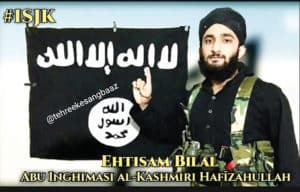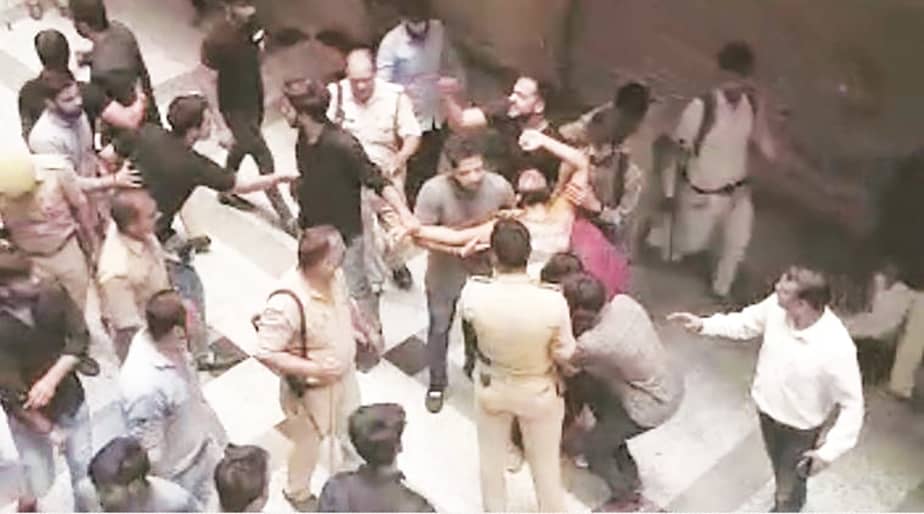A brawl at a private university in Greater Noida in October put the spotlight on the suspicion with which Kashmiri students are treated on campuses
A campus fight which escalated into a full-blown mob attack changed one student’s life forever — he dropped out and joined a militant group. This unfortunate incident at Sharda University brings into focus the treatment of Kashmiris, especially boys, in Delhi-NCR.
Looked at with suspicion, overshadowed and sidelined among a crowd for their religion and region, many generally only hang out within their own circle. Aeshal Nisar Dalal, who won the student union elections to become president of the College for Vocational Studies this year, says that the resistance towards Kashmiris is real.
“I have felt discriminated against in many ways even during classes. They question my religion, my being a Kashmiri”, says Dalal. However, he admits, luck was on his side as he made friends who had not internalised the prejudice that is widespread.
At Sharda University, situated in Knowledge Park, Greater Noida, four hundred Kashmiri students are enrolled. Hailing from a region that sees much turmoil, they come to the city for higher studies expecting their education will open the door to plenty of opportunities.
Amongst them was Ehtisham Bilal, enrolled for a Bachelor’s in Medical Imaging Technology (BMIT). He landed in Delhi from Srinagar and joined Sharda University on September 18. Just over a month later, things would change drastically, for him and his family back home in Kashmir.
At the university, there is still an unease with the people of the region. Students are reluctant to speak about what happened, let alone be associated in any way with Bilal, lest people accuse them of having ties with someone who may have joined the ranks of militants.
As it happened
The sequence of events, as related to Patriot by the university public relations officer (PRO) Ajit Kumar, are as follows. A group of students from Bachelor of Business Administration were witness to a student from Afghanistan exchange bitter words with an Indian student. This escalated into a fight on campus between two groups —from Afghanistan and India — on October 1.
Tempers boiled over after one of the main players in this fight had his cousin Deepak Sharma — a Bajrang Dal leader — join in with his goons, along with Ved Nagar of Gau Raksha Dal. Now it became a communal confrontation.

On October 4, Bilal was reportedly just another student going about his day when he was questioned by a group of Indians about his origins — being mistaken for an Afghani. When he said he was Kashmiri, they refused to believe him, and beat him up.
The PRO, though, has a different narrative: That Bilal joined in and wrestled with the cops who were called in to restore order, instead of saving himself. “No matter how strong you are, a mob will overpower you. But he still fought”, he says.
Bilal went to the hospital for treatment and was discharged the same day but something inside him snapped. Kumar says this event only gave him a nudge and that Bilal was already “inclined in such a way”, implying that he was radicalised. He supports this argument with the fact that two years ago, the student was booked by the CRPF in Kashmir for stone pelting.
One person known to Bilal says that after the attack his behaviour was normal. He attended classes regularly until October 28, when he asked for permission to go out for the day and never returned. A missing persons case was filed in the police station by his cousin and college authorities. Scrutiny of his phone records later showed the events of the day.
At 12 noon on the 28th he was on the Delhi metro, by 1:30 pm he had reached the airport, by 3 pm he was in Srinagar and 4:30 pm Pulwama, after which his phone was switched off.
By November 2, he was claiming over the internet that he had joined terrorist group ISJK, an outfit influenced by Islamic State ideology. A video was released with the image of Bilal dressed in black, a grenade vest strapped around his chest, and IS’s black banner forming the backdrop. He blamed the assault on Afghan students at his university which, he said, made him realise he could no longer “avoid jihad in Allah’s way.”
“I was already a soldier of Jundul Khilafah when I fought against more than 100 infidels for Afghan Muslims,” he says, referring to the campus violence. “The only difference was that I wasn’t aware of it. In my heart, I had already pledged allegiance to Jundul Khilafah but when infidel dogs came in hordes to attack me, I understood that I have avoided Jihad in Allah’s way for long enough. Not any more.”
Observers are blaming the university administration for lax in security. The incident should not have been allowed to happen in the first place, and afterwards, Bilal should have been counselled.

Regarding the larger question of prejudice against Kashmiris, an example of harassment was given by a classmate of Bilal’s who does not wish to be named. He himself was questioned by a “large group” of students in front of his professor, inside his classroom about his place of origin. They only believed him after he showed them his Aadhaar card.
Not just that, he had also recently, along with fellow Kashmiri friends, been blamed for a brawl that took place in the apartment complex in which they live. His cousin says that just because they are Kashmiris, the other residents thought they must have been involved in the fight. “They think we are the ones always instigating trouble”.
The anti-national tag
Aeshal Nisar Dalal says he was elected to the post of president of his Delhi University college despite having a multitude of odds stacked against him.
When he first decided to come to Delhi, Dalal’s father was very happy. “He said you must go to another part of the country and explore the other side”. His mother, was sceptical, having seen several cases of their own neighbours who ventured out of Kashmir getting embroiled in fake cases. “Kashmiris become an easy target,” he says.
At first, he made friends only with people from his own state, like many other Kashmiris living in Delhi. “We get one narrative, about how people here are. How there’s zero acceptance,” he says.
Over time, he made friends with people from Uttar Pradesh and Bihar who eventually helped him contest the election and win. “When I thought about contesting, I really didn’t think the fight would become about my origins, my religion or my colour.”
But it did. His friends were questioned — even by a faculty member — about why they were hanging around with an “anti-national”.
This rhetoric gained ground after August 15. His innocuous message wishing people a happy Independence Day lit a fire. According to his critics and opponents, it supposedly lacked emotion — the flag and Jai Hind messages — which was seen as a sign of his anti-Indian proclivities.
He had, admittedly, been vocal about condemning “human rights violations” and groups like the ABVP made it an issue.
“In our college, the environment soon changed. They kept calling me, texting me, abusing my family, saying that I should be hung, that this bastard should be thrown out the country”. The abuse continued and culminated in a sedition charge by a fellow student.
This was followed by an article in Dainik Jagran announcing that “anti-national activity” in DU, like JNU, had begun.
On the day of voting, his cousins and some friends reached the college wearing long kurtas. “My friends at college panicked. ‘What are they doing, wearing this and coming?’ they asked me. And I agreed. We couldn’t have taken a chance”. So he made them change into a less conspicuous outfit of trousers and shirt.
CASE CLOSED
An enquiry committee to look into the brawl at Sharda University was constituted by the administration on October 3 and submitted its report on October 29.
The committee sent show cause notices to more than 70 students. Four students were expelled, which includes the student whose Bajrang Dal cousin instigated a mob. Fifteen were rusticated for one to two semesters, which includes Ehtisham Bilal. A further 50 students were issued a warning.
DSP AK Srivastav at Greater Noida police station says the clash between the Afghan and Indian students was sorted out by mutual agreement. The missing person case here will soon be closed.





